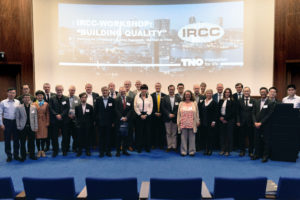
IRCC explores building regulatory compliance
 The Inter-Jurisdictional Regulatory Collaboration Committee (IRCC) meets twice a year to discuss current issues in building safety. The Code Council represents the United States in this network of building regulatory officials from 14 countries. The second meeting of 2018 took place in early October in The Hague, Netherlands, and included a workshop entitled, “Building Quality — Improving the Compliance to Building Regulations.”
The Inter-Jurisdictional Regulatory Collaboration Committee (IRCC) meets twice a year to discuss current issues in building safety. The Code Council represents the United States in this network of building regulatory officials from 14 countries. The second meeting of 2018 took place in early October in The Hague, Netherlands, and included a workshop entitled, “Building Quality — Improving the Compliance to Building Regulations.”
The workshop featured a keynote address delivered by Dame Judith Hackitt, chair of the task force that produced the report of England’s Independent Review of Building Regulations and Fire Safety, in the wake of the tragic Grenfell Fire. Dame Judith presented a comprehensive overview of the process that her commission undertook to investigate the regulatory system under which this disaster occurred.
Although many individuals and organizations were quick to blame the cladding material used on the towers — and indeed the British Parliament recently passed a new regulation banning combustible cladding products — the focus of the task force was the systemic failure of the overall system. The main finding was that the regulatory system had been extremely confusing and wholly ineffective for many years — a fact that was well-known to most of the stakeholders who were interviewed — but no one knew how (or who should be responsible) to fix it.
The recommendations of the commission were fundamental and significant, and included 53 specific changes meant to create a “simpler but more robust regulatory framework and overall system for high-rise buildings.” As a follow up to the so-called Hackitt Report, Dame Judith is now leading an industry safety steering committee that will address the effective implementation of the recommendations.
 In addition to the keynote address, the workshop included presentations from building regulators in the Netherlands and Australia, two countries that are also closely examining their regulatory accountability to address systemic problems that were discovered in the wake of the Grenfell Tower Fire and the Lacrosse fire in Australia. Specifically, new legislation is currently under consideration in the Netherlands that would create a public-private partnership to increase accountability among both contractors and the building authority.
In addition to the keynote address, the workshop included presentations from building regulators in the Netherlands and Australia, two countries that are also closely examining their regulatory accountability to address systemic problems that were discovered in the wake of the Grenfell Tower Fire and the Lacrosse fire in Australia. Specifically, new legislation is currently under consideration in the Netherlands that would create a public-private partnership to increase accountability among both contractors and the building authority.
In Australia, an assessment called “Building Confidence” was commissioned and produced by Peter Shergold ad Bronwyn Weir following the Lacrosse fire, and concluded that while the regulations were good, they were not being used or followed, creating systemic problems within the regulatory system. The Shergold/Weir report recommended 24 changes focused on training and registration, accountability, and post-construction information management, record keeping and document accuracy.
The common theme was clear: performance-based building safety systems are at risk of failing without an effective system of implementation, enforcement and accountability.
Related:
IRCC meets in Vienna
The Code Council travels to Singapore
The final presentation was given by a professional proof engineer from Germany, who explained the unique system employed by the building authorities in that country. The basis of the proof engineering (or check engineering) concept is a pre-emptive (versus repressive) system that acknowledges that more than 90 percent of structural failures are the result of human error. The system employs a “four eye” principle for design checking, undertaken by proof engineers licensed by, and acting on behalf of, the states — and verified to be acting independently from the client to ensure no conflict of interest.
German regulations require that no permits for certain classes of buildings (risk-based defined by structure and function) will be issued without the review of an independent proof engineer. Following the permitting of a building, the proof engineers remain involved, conducting periodic, random, on-site inspections throughout the construction process, with their work culminating in a comprehensive file of how the building was built. The process to become a proof engineer is extremely rigorous, with 80 percent of applicants failing to meet the standards, which include passing written and oral exams, proven experience and integrity, and passing a background check. Currently there are approximately 600 licensed proof engineers in Germany, with a primary focus on structural integrity and fire inspection.
This extremely timely and informative workshop followed two days of discussions among the IRCC members about many other common challenges faced by building regulators internationally, including ensuring the safety of building materials, accessibility, and the regulation of residential properties that are being used for short-term stay. The Code Council remains regularly engaged with international regulatory bodies on critical building safety topics in addition to participating in the twice-annual IRCC meetings.







